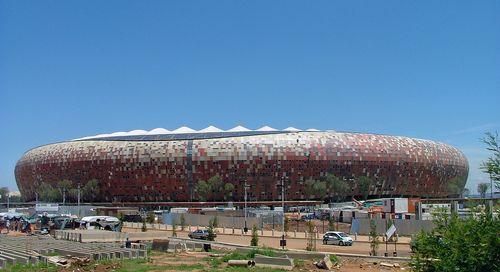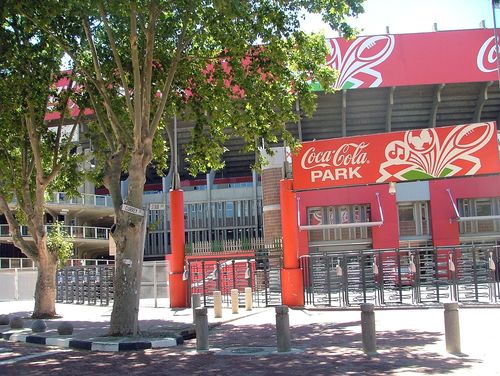by TRAVIS CLARK
JOHANNESBURG, South Africa — Travelers landing in OR Tambo airport for the first time next June will be hard pressed to think they are in Africa. A cosmopolitan city known as the economic capital of South Africa, this city is proud and ready to kick off the tournament next year at Soccer City stadium.
Driving into the city, the urban sprawl extends as far as the eye can see. Skyscrapers dot the skyline in the distance, while suburbs similar to those in any other European city care closer in view. Upon closer inspection, the biggest difference is the abundance of high-security gates surrounding housing developments, houses and apartments.
The view tips you off that crime is certainly a problem. Even then, other cities in South Africa — Port Elizabeth, Cape Town and Durban all feature the same security precautions. Crime may be something that Johannesburg deals with, but tournament organizers insist that city officials will be out in full force next year to ensure a smooth World Cup experience for fans.
In contrast to the rest of the host cities next year, Johannesburg features two stadiums that will be used for the World Cup. Soccer City, located near the township of Soweto on the outskirts of the city, will open and close the cup. Ellis Park, now known as Coca Cola Park, is the other.
Neither of the two stadiums are new — Soccer City, previously known as FNB Stadium, was originally completed in 1989. Coming into view from the highways of Johannesburg, it is an imposing structure. Internal improvements and work completed on the stadium has increased capacity to 94,700. R2.2 billion ($291,000) was spent on the project. External improvements are still in progress, but on schedule for completion by next June.
Its companion, Ellis Park, is much older. First built back in 1927, during the days of apartheid it served primarily as a rugby stadium. Today, it's home to the Orlando Pirates and has been the scene of a number of Soweto derbies between Kaizer Chiefs and the Pirates. U.S. fans will be familiar with it, as it hosted the 2009 Confederations Cup Final against Brazil.
For the World Cup, Ellis Park will have a capacity of 65,000 thanks to an extension of the seating area. Improvements to some of the stadium's internal amenities have been completed as well, but no major projects were completed.
Because of the urban location, there isn't as contentious of a debate about the future use of the stadiums. Between the Premier Soccer League teams dotting the nearby townships, and the rugby teams in the area, both stadiums will see plenty of matches.
Johannesburg, on the whole, will be a very interesting scene during the World Cup. The public transportation has received a face lift, but visitors will have to rely on either rental cars or taxis — depending on what happens in the next six months. World Cup organizers continue to insist that they will do everything in their power to ensure a safe and memorable World Cup experience. As one of the cities where U.S. fans will most likely converge, Americans will be hoping organizers can follow through on those promises.



Is this a venue/s post or a host city post?
Per a comment on the Moses Mabhida Stadium/Durban preview post: Who plays in this city/these venues?
2.2 billion rand is 290 million dollars, not 290 thousand. Also, you posted that Nelson Mandela Bay Stadium cost “R1.1 million ($150 million)” but $150 million dollars would be 1.1 billion rand.
If you need help with exchange rates you can use google
http://www.google.com/#hl=en&q=2.2+billion+rand+in+dollars
how much is the beer gonna cost in the stadium???
Thirsty Thursday!!!
In response to the second part of your post, I think Travis made this pretty clear in his original post. The general stereotypical images about Africa (including the ignorant ones with all sorts of animals like lions and cheetahs that were pushed by ESPN at the Confederations Cup) are exactly those that you describe, and Travis is telling those who go not to expect that in any way, shape, or form. Having been there or not, I think he can pretty easily attest to the urbanity of one of South Africa’s largest cities.
Its not a tire. Its called a Calabash is Africa. Women typically carry it on their heads, and Travis you obviously have never been to Africa, the best image of the continent consistently shown is people with animals. Most of African nation’s major cities are developed with ROADS, suburbs, nice cars like everywhere else.
If you not familiar with South Africa Taxis:
http://www.cmt4austin.org/Image_Files_SharedTaxi/Soweto_Taxi_Rank.jpg
They are the preferred mode of transport for the majority of locals. The amount of white mini vans in South Africa is astonishing.
We’re planning on attending SA and I have known some people from SA who said they would never step foot in Jo-burg again and said I’m crazy for wanting to go. Crime is different than in the US where someone points a gun at you, takes your money, and leaves. They point a gun at you, take your money, and kill you. Scary.
Thanks for the TMZ update, Jim.
i’ll never see it with my own eyes.
Who decided that stadiums should look like a giant tire laying on it’s side?
It was the Germans, wasn’t it?